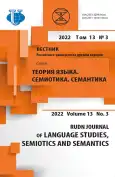‘Probability’ and ‘Possibility’ in Creative Language Use: on Impossible Possibility in German Texts
- 作者: Demyankov V.Z.1
-
隶属关系:
- Institute of Linguistics, Russian Academy of Sciences
- 期: 卷 13, 编号 3 (2022)
- 页面: 589-607
- 栏目: COGNITIVE RESEARCH
- URL: https://journal-vniispk.ru/2313-2299/article/view/323478
- DOI: https://doi.org/10.22363/2313-2299-2022-13-3-589-607
- ID: 323478
如何引用文章
全文:
详细
Being culture-dependent, stylistics involves choice of facts and of linguistic means for exposing events cohesively in narratives and for coherent chains of arguments in discourses. Both factual accuracy and logical consistency rely on epistemic warrants especially when verification procedures are not directly available. Ascribing reliable sources to opinions makes the facts and arguments conveyed in narratives and in discourses more or less probable, especially if their guarantors’ reputation is high enough, cf. “Tell me who thinks so, and I’ll tell you if this view is probable”, or even “and I’ll tell you if you are right”. Acceptability and creativity of language use depend on subconscious statistics, with their scales and measures of possibility and probability: infrequent ways of informing are the best candidates for being considered creative. Lexical items ‘(im)possible’, ‘(im)probable’, ‘(in) feasible’, ‘can (not)’, ‘may (not)’, etc., with negative marks and without them, normally serve as truthconditional “hedges” of judgments, as their weak epistemic warrants. Their use, too, may be more or less creative and depends on mental cultures in the framework of which narratives and discourses are produced and interpreted. This paper analyzes double hedge constructions in which a modal verb and an adverbial meaning ‘(im)possibly’ or ‘(im)probably’ are jointly used in sentences, e. g. ‘can possibly’ and ‘might probably’ in English. These constructions look strange or even ungrammatical in Russian, but they are not infrequent in German. Semantics and statistics of these phrases in German are described in this paper, based on a large corpus of fictional and non-fictional German texts. It is shown that statistically, these double hedges are most frequently used for focusing on negative commitments, especially in sentences with ‘unmöglich können’ (“can impossibly”). At the same time, the frequency of ‘kann unwahrscheinlich’ (“can improbably”) is utterly low.
作者简介
Valery Demyankov
Institute of Linguistics, Russian Academy of Sciences
编辑信件的主要联系方式.
Email: vdemiank@iling-ran.ru
ORCID iD: 0000-0001-9331-3708
Prof. Dr.Sc. (Philology), Professor, Chief Researcher, Head of the Department of Theoretical and Applied Linguistics, Head of the Scientific and Educational Center for Theory and Practice of Communication named after Yu.S. Stepanov
1 bld., 1 Bolshoy Kislovsky lane, Moscow, Russian Federation, 125009参考
- Novikov, L.A. (1982). Language mastery. Moscow: Pedagogy. (In Russ.).
- Thon, J.-N. (2016). Transmedial Narratology and Contemporary Media Culture. Lindoln; London: University of Nebraska Press.
- Altes, L.K. (2014). Ethos and Narrative Interpretation: The Negotiation of Values in Fiction. Lincoln; London: University of Nebraska Press.
- Cook, G. (1994). Discourse and Literature. Oxford etc.: Oxford University Press.
- Bruce, I. (2008). Academic Writing and Genre: A Systematic Analysis. London; New York: Continuum.
- Kiaer, J. (2014). Pragmatic Syntax. London; New Delhi; New York; Sydney: Bloomsbury.
- McWhorter, J.H. (2014). The Language Hoax: Why the World Looks the Same in Any Language. Oxford: Oxford University Press.
- Lyons, J. (1977). Semantics. Cambridge etc.: Cambridge University Press.
- Plantinga, A. (1993). Warrant and Proper Function. New York: Oxford University Press.
- Plantinga, A. (1995). Review: Précis of Warrant: The Current Debate and Warrant and Proper Function. Philosophy and Phenomenological Research, 55(2), 393–396. https://doi.org/10.2307/2108556
- Stalnaker, R. (2014). Context. Oxford: Oxford University Press.
- Groddeck, W. (1995). Reden über Rhetorik: Zu einer Stilistik des Lesens. Basel; Frankfurt am Main: Stroemfeld.
- Ducrot, O. (1972). Dire et ne pas dire: Principes de sémantique linguistique. Paris: Hermann.
- Aikhenvald, A.Y. (2014). The grammar of knowledge: a cross-linguistic view of evidentials and the expression of information source. In: The Grammar of Knowledge: A Cross-Linguistic Typology, Aikhenvald A.Y., Dixon R.M.W. (eds.). Oxford etc.: Oxford University Press. pp. 1–51.
- Wittgenstein, L. (1974) Philosophical grammar / Translated by Anthony Kenny / Edited by R. Rhees. Oxford: Blackwell.
- Bender, N. (2018). Verpasste und erfasste Möglichkeiten: Lesen als Lebenskunst. Basel: Schwabe.
- Demyankov, V.Z. (2020). On linguistic techniques of adapting opinions. Issues of cognitive linguistics, 4, 5–17. https://doi.org/10.20916/1812-3228-2020-4-5-17 (In Russ.).
- Herbst, Th., Schmid, H.-J. & Faulhaber, S. (2014). From collocations and patterns to constructions — an introduction. In: Constructions. Collocations. Patterns, Herbst, Th.; Schmid, H.-J.; Faulhaber, S. (eds.). Berlin; Boston: Walter de Gruyter. P. 1–9.
- Demyankov, V.Z. (2021). Linguistic creativity in discourses on possibility and on probability. In: Linguistic Creativity in Different Types of Discourses: Its Limits and Possibilities. Moscow: Valent. Pp. 21–99. (In Russ.).
- Demyankov, V.Z. (2022). Semantic reduplication in judgments on possibility. Cognitive Investigations, 3. (In print) (In Russ.).
补充文件









